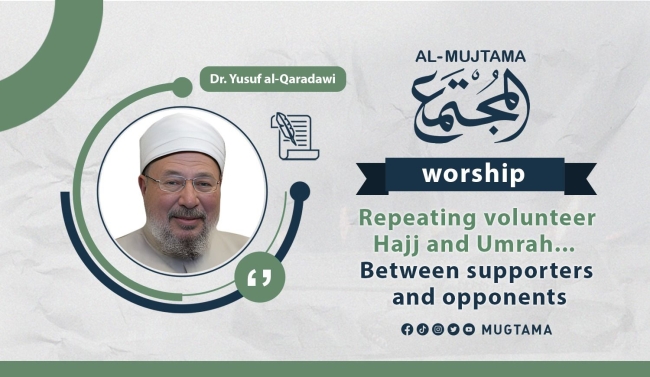Repeating volunteer Hajj and Umrah... Between supporters and opponents Featured
Dr. Yusuf al-Qaradawi addresses this issue in his book “Fiqh al-Awlawiyat” meaning (The jurisprudence of priorities), explaining that most of those who crowd the Hajj season every year are those who have been exempted from the obligation and have performed Hajj before. Those who have never performed Hajj before represent only 15%. If there are about two million pilgrims, then those who perform Hajj for the first time usually do not exceed 300,000. So let those who volunteer for Umrah throughout the year and especially in the month of Ramadan give up their Hajj and Umrah and spend their expenses for the sake of Allah and donate their costs in order to save their Muslim brothers and sisters who are exposed to physical and moral destruction and to the brutal aggression that violates their sanctuaries.
"I have known some pious and good-hearted Muslims in Qatar," says al-Qaradawi, "and in other Gulf countries and Egypt, who are keen to perform the Hajj ritual every year. I know some of them who have been performing Hajj annually for forty years. In one year, I told them that I had just returned from Indonesia, where I saw the enormous work that Christianization is doing there, and I saw the Muslims' urgent need for educational, medical, and social institutions. I said to these brothers: What about intending to leave Hajj this year and donate its expenses to resist Christianization?"
"But the brothers said: Whenever the month of Dhul Hijjah comes, we feel a desire that we cannot resist for Hajj and the rituals, and we feel our souls flying there and we feel overwhelming happiness. This is what was said (Bishar al-Haafi). If the understanding was correct and the faith was sincere and the Muslim knew the meaning of Fiqh al-Awlawiyat (The jurisprudence of priorities), he would have used the expenses of Hajj to start an Islamic project that guarantees orphans, or feeds the hungry, or shelters the homeless, or treats the sick, or teaches the ignorant, or provides job opportunities for the unemployed."


